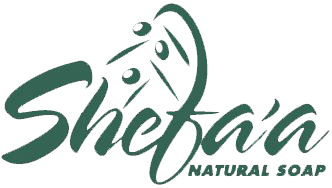What is Aleppo Soap
Aleppo Soap is named for the ancient city in which it first was produced, Aleppo, in Syria, and has been produced and distributed all over the world for over 1,500 years. The foundation of Aleppo Soap is olive oil, lye, and a unique ingredient, laurel berry oil. Laurel berry oil is known to help heal dermatological conditions.
Shefa’a Natural Soap is distinguished because our soaps are made from the highest quality ingredients. The olives are locally procured from farms that do not use chemicals or genetic modification. The laurel berries are wildcrafted in the mountainous forests of Syria and Lebanon which is environmentally sustainable, preserves biodiversity, and is naturally free from chemicals or genetic modifications of any kind.
Olive Oil Benefits:
Rich in minerals, such as manganese, phosphorous, potassium and vitamins A,B,C,E, and F, it has tremendous capabilities of healing and fixing damaged skin and hair. One of the key benefits for the skin is indulgent nourishment. When used on your scalp, olive oil helps prevent hair loss and strengthens the roots of your hair.
Laurel Berry Oil Benefits:
Researchers have identified Laurel Berry Oil to be an antifungal, antibacterial, and antiviral agent. It has been used for over 2,000 years to treat almost every skin dermatitis, such as eczema, psoriasis, fungal infections, acne, dry and flakey skin, and dandruff, and it is known to be very effective to clean to skin from odors caused by bacteria and fungi.
History of Aleppo Soap
Legends goes that famous women such as Cleopatra and queen Zenobia were used to using Aleppo soap to keep their skin fresh and their hair healthy.
It is commonly thought that the process of soap-making emanated from the Levant region (of which Aleppo is a main city) and to have moved west from there to Europe after the first crusades based on the claim that the earliest soap made in Europe was just after the crusades, but in fact the Romans in the first century AD knew about soap and Zosimos of Panopolis ca. 300 AD described soap and soap making.
Production Process
First, olive oil is poured into a large, in-ground vat along with water and lye. Underneath the vat, an underground fire heats the contents to a steady boil. Boiling lasts for three days while the oil reacts with the lye and water to become the thick liquid soap we know.
Laurel oil is added at the end of the process mentioned above and gets mixed into the concoction, The mix is then taken from the vat and poured over a large sheet of waxed paper on the floor of the factory.
At this point the resulting soap is a large, green, flat mass and is allowed to cool and harden for a day. While the soap is cooling, workers with planks of wood strapped to their feet walk over the soap to try to smooth out the batch and make it even in thickness and density.
The soap is then cut; this is done using a rake-like cutting device that is maneuvered through the soap to cut it from one end and then again the other way until the whole mass is cut into even individual cubes. At this point the soap is stamped with Shefaa’s logo to get the cubes ready to be stacked in staggered cylinders to allow maximum air exposure. Once they have dried sufficiently, they are put into a special underground cool chamber to be aged between six months and a year depending on the weather conditions.
